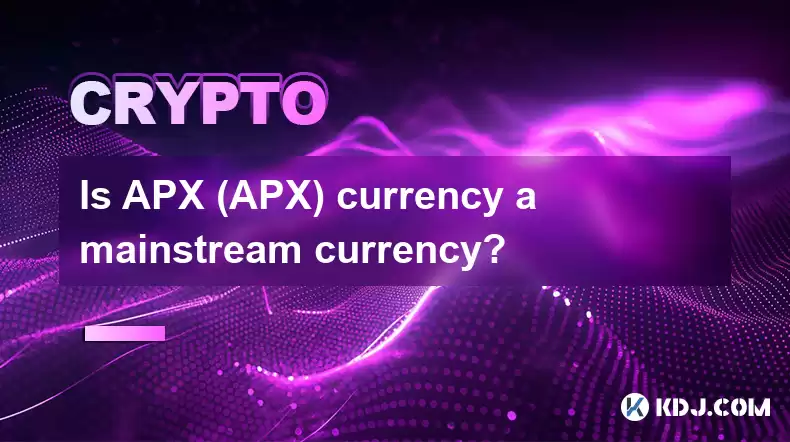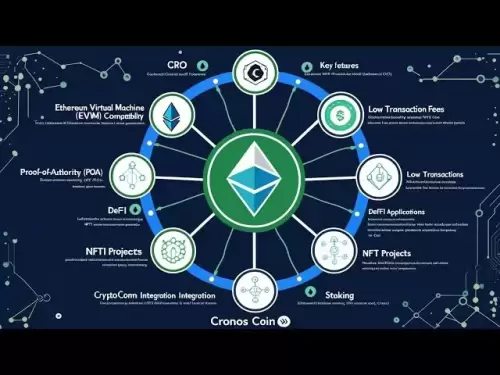-
 Bitcoin
Bitcoin $119300
1.07% -
 Ethereum
Ethereum $3730
3.87% -
 XRP
XRP $3.235
0.29% -
 Tether USDt
Tether USDt $1.000
0.00% -
 BNB
BNB $783.5
1.88% -
 Solana
Solana $188.7
0.25% -
 USDC
USDC $0.0000
-0.01% -
 Dogecoin
Dogecoin $0.2399
-0.44% -
 TRON
TRON $0.3157
2.37% -
 Cardano
Cardano $0.8254
1.94% -
 Hyperliquid
Hyperliquid $42.83
0.14% -
 Stellar
Stellar $0.4372
3.21% -
 Sui
Sui $3.859
4.91% -
 Chainlink
Chainlink $18.53
3.53% -
 Hedera
Hedera $0.2464
0.01% -
 Bitcoin Cash
Bitcoin Cash $519.8
2.46% -
 Avalanche
Avalanche $24.24
2.17% -
 Litecoin
Litecoin $113.7
0.73% -
 UNUS SED LEO
UNUS SED LEO $8.990
0.30% -
 Shiba Inu
Shiba Inu $0.00001390
0.21% -
 Toncoin
Toncoin $3.188
1.49% -
 Ethena USDe
Ethena USDe $1.001
0.02% -
 Polkadot
Polkadot $4.090
-0.91% -
 Uniswap
Uniswap $10.40
4.08% -
 Monero
Monero $326.6
3.12% -
 Bitget Token
Bitget Token $4.627
-0.42% -
 Pepe
Pepe $0.00001281
0.76% -
 Dai
Dai $1.000
0.01% -
 Aave
Aave $291.6
0.98% -
 Cronos
Cronos $0.1269
7.26%
Is APX (APX) currency a mainstream currency?
APX currency, primarily used within the ApolloX cryptocurrency derivatives exchange, has limited mainstream adoption due to its narrow availability and lack of integration with external platforms.
Dec 23, 2024 at 03:51 pm

Key Points:
- APX (APX) currency is a platform-native coin of the ApolloX exchange.
- APX is primarily used for utility purposes within the ApolloX ecosystem, such as trading fee reductions, governance participation, and staking rewards.
- While APX has achieved some adoption and growth within the ApolloX community, its mainstream status within the broader cryptocurrency market is debatable.
Steps for Understanding APX's Mainstream Currency Status:
1. Utility and Usage within ApolloX Ecosystem:
- APX is primarily designed for use within the ApolloX exchange, a decentralized cryptocurrency derivatives platform.
- Users holding APX can enjoy reduced trading fees on the exchange, potentially leading to cost savings for active traders.
- APX also plays a role in governance, allowing holders to participate in the decision-making process of the ApolloX platform.
- Additionally, APX staking rewards incentivize users to hold and support the ApolloX ecosystem.
2. Market Capitalization and Trading Volume:
- Market capitalization refers to the total value of all APX tokens in circulation and is a measure of its market dominance.
- Trading volume represents the amount of APX traded in a given timeframe and indicates market liquidity.
- APX's market capitalization and trading volume are relatively low compared to major cryptocurrencies like Bitcoin (BTC) and Ethereum (ETH), indicating limited adoption beyond the ApolloX ecosystem.
3. Exchange Support and Availability:
- The number of exchanges that list and support APX can influence its accessibility and mainstream appeal.
- Currently, APX is primarily traded on the ApolloX exchange and a few other smaller exchanges.
- Listing on larger and more popular exchanges could increase APX's exposure and potentially boost mainstream adoption.
4. Integration with Third-Party Platforms:
- Integration with non-ApolloX platforms and services can enhance APX's utility and reach.
- For example, support for APX in DeFi protocols or payment gateways could expand its use cases and attract new users.
- Limited integration with external platforms may hinder APX's mainstream status.
5. Community Development and Adoption:
- A strong and active community can contribute to the growth and adoption of a cryptocurrency.
- ApolloX has a dedicated community, but its size and engagement compared to major cryptocurrencies may be limited.
- Community-driven initiatives, such as meetups, developer tools, and educational resources, can foster adoption and mainstream acceptance.
FAQs:
Q: What is the purpose of APX currency?
A: APX is a platform-native coin used for utility purposes within the ApolloX cryptocurrency derivatives exchange.
Q: Is APX considered a mainstream cryptocurrency?
A: APX's mainstream status within the broader cryptocurrency market is debatable, as its adoption is primarily limited to the ApolloX ecosystem.
Q: Where can I buy and sell APX?
A: APX is currently traded on the ApolloX exchange and a few other smaller exchanges.
Q: How do I use APX?
A: APX can be used to pay for trading fees, participate in governance, and earn staking rewards on the ApolloX exchange.
Q: What is the future potential of APX?
A: The future of APX depends on the growth of the ApolloX platform, the adoption of APX in external platforms, and the overall market conditions for cryptocurrencies.
Disclaimer:info@kdj.com
The information provided is not trading advice. kdj.com does not assume any responsibility for any investments made based on the information provided in this article. Cryptocurrencies are highly volatile and it is highly recommended that you invest with caution after thorough research!
If you believe that the content used on this website infringes your copyright, please contact us immediately (info@kdj.com) and we will delete it promptly.
- Bitcoin, Jim Cramer, and the US Deficit: A Wall Street Story
- 2025-07-25 10:30:11
- TGEs, Scalability & Privacy Tech: Decoding the Future of Blockchain
- 2025-07-25 10:30:11
- TRON, Crypto Payroll, and Stablecoins: A New York Minute on the Future of Finance
- 2025-07-25 08:30:11
- WazirX, Revote, and Crypto Unlock: A New York Minute on the Latest Developments
- 2025-07-25 06:50:11
- Hong Kong Stablecoin Regulation: Navigating the Hype and Hurdles
- 2025-07-25 08:30:11
- Bitcoin LTHs, CDD Ratio, and Distribution: What's the Deal?
- 2025-07-25 08:50:12
Related knowledge

What is Chainlink (LINK)?
Jul 22,2025 at 02:14am
Understanding Chainlink (LINK): The Decentralized Oracle NetworkChainlink is a decentralized oracle network designed to bridge the gap between blockch...

What is Avalanche (AVAX)?
Jul 22,2025 at 08:35am
What is Avalanche (AVAX)?Avalanche (AVAX) is a decentralized, open-source blockchain platform designed to support high-performance decentralized appli...

What is Polkadot (DOT)?
Jul 19,2025 at 06:35pm
Understanding the Basics of Polkadot (DOT)Polkadot (DOT) is a multi-chain network protocol designed to enable different blockchains to transfer messag...

What is Litecoin (LTC)?
Jul 23,2025 at 11:35am
Overview of Litecoin (LTC)Litecoin (LTC) is a peer-to-peer cryptocurrency that was created in 2011 by Charlie Lee, a former Google engineer. It is oft...

What is Monero (XMR)?
Jul 21,2025 at 10:07am
What is Monero (XMR)?Monero (XMR) is a decentralized cryptocurrency designed to provide enhanced privacy and anonymity for its users. Unlike Bitcoin a...

How to add indicators to Ethereum chart on TradingView?
Jul 19,2025 at 07:15am
What Is an Ethereum Chart on TradingView?The Ethereum chart on TradingView is a visual representation of the price movement of Ethereum (ETH) over a s...

What is Chainlink (LINK)?
Jul 22,2025 at 02:14am
Understanding Chainlink (LINK): The Decentralized Oracle NetworkChainlink is a decentralized oracle network designed to bridge the gap between blockch...

What is Avalanche (AVAX)?
Jul 22,2025 at 08:35am
What is Avalanche (AVAX)?Avalanche (AVAX) is a decentralized, open-source blockchain platform designed to support high-performance decentralized appli...

What is Polkadot (DOT)?
Jul 19,2025 at 06:35pm
Understanding the Basics of Polkadot (DOT)Polkadot (DOT) is a multi-chain network protocol designed to enable different blockchains to transfer messag...

What is Litecoin (LTC)?
Jul 23,2025 at 11:35am
Overview of Litecoin (LTC)Litecoin (LTC) is a peer-to-peer cryptocurrency that was created in 2011 by Charlie Lee, a former Google engineer. It is oft...

What is Monero (XMR)?
Jul 21,2025 at 10:07am
What is Monero (XMR)?Monero (XMR) is a decentralized cryptocurrency designed to provide enhanced privacy and anonymity for its users. Unlike Bitcoin a...

How to add indicators to Ethereum chart on TradingView?
Jul 19,2025 at 07:15am
What Is an Ethereum Chart on TradingView?The Ethereum chart on TradingView is a visual representation of the price movement of Ethereum (ETH) over a s...
See all articles

























































































